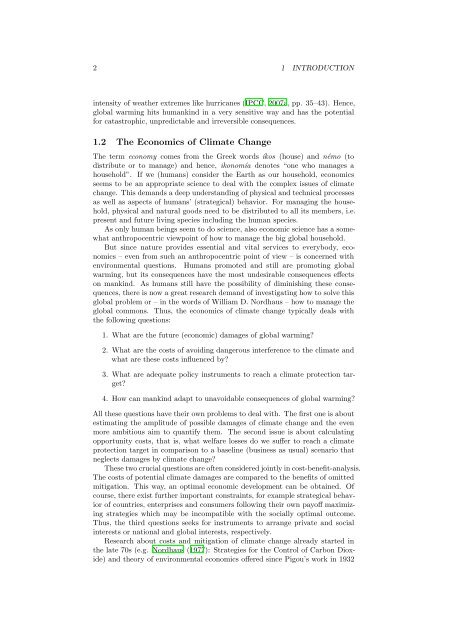Modeling Climate Policy Instruments in a Stackelberg Game with ...
Modeling Climate Policy Instruments in a Stackelberg Game with ...
Modeling Climate Policy Instruments in a Stackelberg Game with ...
Create successful ePaper yourself
Turn your PDF publications into a flip-book with our unique Google optimized e-Paper software.
2 1 INTRODUCTION<br />
<strong>in</strong>tensity of weather extremes like hurricanes (IPCC, 2007a, pp. 35–43). Hence,<br />
global warm<strong>in</strong>g hits humank<strong>in</strong>d <strong>in</strong> a very sensitive way and has the potential<br />
for catastrophic, unpredictable and irreversible consequences.<br />
1.2 The Economics of <strong>Climate</strong> Change<br />
The term economy comes from the Greek words íkos (house) and némo (to<br />
distribute or to manage) and hence, ikonomía denotes “one who manages a<br />
household”. If we (humans) consider the Earth as our household, economics<br />
seems to be an appropriate science to deal <strong>with</strong> the complex issues of climate<br />
change. This demands a deep understand<strong>in</strong>g of physical and technical processes<br />
as well as aspects of humans’ (strategical) behavior. For manag<strong>in</strong>g the household,<br />
physical and natural goods need to be distributed to all its members, i.e.<br />
present and future liv<strong>in</strong>g species <strong>in</strong>clud<strong>in</strong>g the human species.<br />
As only human be<strong>in</strong>gs seem to do science, also economic science has a somewhat<br />
anthropocentric viewpo<strong>in</strong>t of how to manage the big global household.<br />
But s<strong>in</strong>ce nature provides essential and vital services to everybody, economics<br />
– even from such an anthropocentric po<strong>in</strong>t of view – is concerned <strong>with</strong><br />
environmental questions. Humans promoted and still are promot<strong>in</strong>g global<br />
warm<strong>in</strong>g, but its consequences have the most undesirable consequences effects<br />
on mank<strong>in</strong>d. As humans still have the possibility of dim<strong>in</strong>ish<strong>in</strong>g these consequences,<br />
there is now a great research demand of <strong>in</strong>vestigat<strong>in</strong>g how to solve this<br />
global problem or – <strong>in</strong> the words of William D. Nordhaus – how to manage the<br />
global commons. Thus, the economics of climate change typically deals <strong>with</strong><br />
the follow<strong>in</strong>g questions:<br />
1. What are the future (economic) damages of global warm<strong>in</strong>g?<br />
2. What are the costs of avoid<strong>in</strong>g dangerous <strong>in</strong>terference to the climate and<br />
what are these costs <strong>in</strong>fluenced by?<br />
3. What are adequate policy <strong>in</strong>struments to reach a climate protection target?<br />
4. How can mank<strong>in</strong>d adapt to unavoidable consequences of global warm<strong>in</strong>g?<br />
All these questions have their own problems to deal <strong>with</strong>. The first one is about<br />
estimat<strong>in</strong>g the amplitude of possible damages of climate change and the even<br />
more ambitious aim to quantify them. The second issue is about calculat<strong>in</strong>g<br />
opportunity costs, that is, what welfare losses do we suffer to reach a climate<br />
protection target <strong>in</strong> comparison to a basel<strong>in</strong>e (bus<strong>in</strong>ess as usual) scenario that<br />
neglects damages by climate change?<br />
These two crucial questions are often considered jo<strong>in</strong>tly <strong>in</strong> cost-benefit-analysis.<br />
The costs of potential climate damages are compared to the benefits of omitted<br />
mitigation. This way, an optimal economic development can be obta<strong>in</strong>ed. Of<br />
course, there exist further important constra<strong>in</strong>ts, for example strategical behavior<br />
of countries, enterprises and consumers follow<strong>in</strong>g their own payoff maximiz<strong>in</strong>g<br />
strategies which may be <strong>in</strong>compatible <strong>with</strong> the socially optimal outcome.<br />
Thus, the third questions seeks for <strong>in</strong>struments to arrange private and social<br />
<strong>in</strong>terests or national and global <strong>in</strong>terests, respectively.<br />
Research about costs and mitigation of climate change already started <strong>in</strong><br />
the late 70s (e.g. Nordhaus (1977): Strategies for the Control of Carbon Dioxide)<br />
and theory of environmental economics offered s<strong>in</strong>ce Pigou’s work <strong>in</strong> 1932
















